Barclays Blocks Crypto Credit Card Payments in Latest Blow to Retail Investors
26.06.2025 8:00 2 min. read Alexander Stefanov
Barclays has announced it will prohibit the use of its credit cards for cryptocurrency purchases starting June 27, marking a significant shift in its stance on digital assets.
The move is expected to impact retail participation in crypto markets, especially as other major financial players are taking steps to make crypto more accessible.
The UK-based banking giant cited concerns over the risks tied to crypto investments, which have long been associated with high volatility and regulatory uncertainty. According to the official update on Barclays’ website, the restriction is meant to mitigate exposure to potentially unstable markets.
Though hints of this policy emerged earlier in the year through comments by Barclaycard’s U.S. head, Paul Wilmore, the restriction now appears to apply more broadly, including to UK customers.
This approach contrasts sharply with developments elsewhere in the payments industry. MasterCard, for example, recently unveiled a partnership with Chainlink to streamline onchain crypto purchases, signaling a more open attitude toward digital finance.
Barclays’ clampdown arrives just as Bitcoin stabilizes above $100,000, following a turbulent period driven by global economic pressures and monetary policy shifts. With interest rates still elevated and borrowing conditions tight, removing a common entry point for retail investors may further dampen enthusiasm in the short term.
Analysts warn that limiting access to crypto via credit card — often the tool of choice for casual investors — could reduce retail inflows at a time when the market is trying to regain momentum.
While some institutions are opening doors to onchain adoption, others like Barclays appear to be slamming them shut.
-
1
California Targets Dormant Crypto With New Custody Proposal
05.06.2025 19:00 2 min. read -
2
Worldcoin Expands to UK With Eye-Scanning ID and Crypto Rewards
10.06.2025 13:00 2 min. read -
3
Less Income, No Buybacks: UBS Revises Berkshire Hathaway Forecast
08.06.2025 12:00 1 min. read -
4
JPMorgan Lays Groundwork for Tokenized Finance with New Blockchain Trademark
17.06.2025 12:00 1 min. read -
5
SBI Group Bets Big on Circle with $50 Million Investment
10.06.2025 20:00 1 min. read
Chinese Tech Firms Turn to Crypto for Treasury Diversification
Digital assets are gaining ground in corporate finance strategies, as more publicly traded companies embrace cryptocurrencies for treasury diversification.
Ripple Faces Legal Setback as Court Rejects Bid to Ease Penalties
Ripple has been dealt another legal blow after a federal judge rejected its attempt to ease court-imposed restrictions and penalties stemming from its long-standing battle with the U.S. Securities and Exchange Commission (SEC).
BIS Slams Stablecoins, Calls Them Ill-Suited for Modern Monetary Systems
Stablecoins are failing where it matters most, says the Bank for International Settlements (BIS), which sharply criticized the asset class in its latest annual report.
Wealthy Clients Demand Better Crypto Expertise from Advisors
A new report from CoinShares reveals that while wealthy investors are embracing digital assets more than ever, they’re also questioning whether their financial advisors are prepared for this shift.
-
1
California Targets Dormant Crypto With New Custody Proposal
05.06.2025 19:00 2 min. read -
2
Worldcoin Expands to UK With Eye-Scanning ID and Crypto Rewards
10.06.2025 13:00 2 min. read -
3
Less Income, No Buybacks: UBS Revises Berkshire Hathaway Forecast
08.06.2025 12:00 1 min. read -
4
JPMorgan Lays Groundwork for Tokenized Finance with New Blockchain Trademark
17.06.2025 12:00 1 min. read -
5
SBI Group Bets Big on Circle with $50 Million Investment
10.06.2025 20:00 1 min. read


